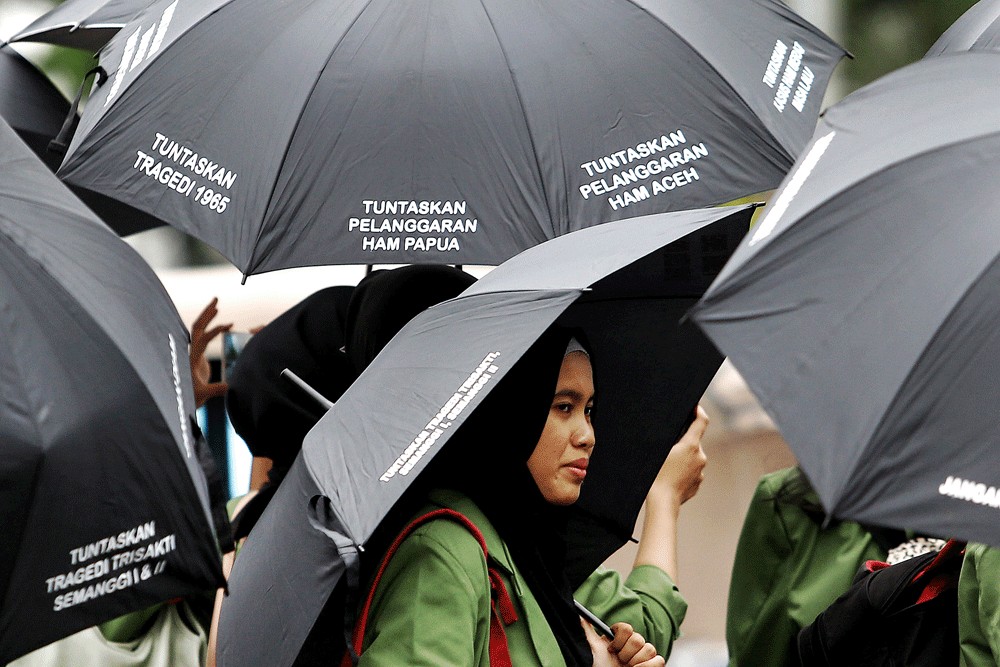Popular Reads
Top Results
Can't find what you're looking for?
View all search resultsPopular Reads
Top Results
Can't find what you're looking for?
View all search resultsIndonesia’s human rights on trial
Some religious minorities, including followers of the Ahmadiyah and Shia, continue to be the subject of officially sanctioned persecutions.
Change text size
Gift Premium Articles
to Anyone
I
ndonesia this month put its human rights records before the Human Rights Council in Geneva under the Universal Periodic Review, the fourth time it has done so since the practice became mandatory for all countries in 2006. From the proceedings in Geneva, it became clear that while Indonesia has nothing to hide, it has plenty to answer for if we go by questions from other countries during the review.
While the international community recognized the progress Indonesia is making, we fall short on issues like Papua, the protection of the lesbian, gay, bisexual, transgender and queer community (LGBTQ) and the persecution against some religious minorities. The government should take heed of the points and concerns raised in Geneva.
External pressures are a welcome supplement to what Indonesian civil society organizations have been fighting for at home. We have come to learn that sometimes it takes the prodding of other countries for the government to get its human rights act together.
With tensions brewing in Papua and amid increasing allegations of abuses, Indonesia’s critics are right in demanding that Jakarta allow the visit of the Office of the High Commissioner on Human Rights (OHCHR) to make independent verification of whatever claims the government is making. It has been four years since the last OHCHR visit to Papua. If we don’t have anything to hide, then we have no reason to delay this visit.
The LGBTQ community continues to suffer from discrimination and persecution and the government is turning a blind eye to these because of the growing homophobia in the public, often instigated by religious leaders. Some religious minorities, including followers of the Ahmadiyah and Shia, continue to be the subject of officially sanctioned persecutions. This is in a country whose constitution guarantees freedom of religion.
Some noteworthy progress recognized in Geneva include the increasing legal protection accorded to women with the enactment law on sexual violence, the law on protecting migrant workers and the decision to raise the minimum marriage age for women to 19 years.
Indonesia has yet to abolish capital punishment, but Law and Human Rights Minister Yasonna Laoly, who represented Indonesia in Geneva, said the government is seeking to allow the court to review individual cases 10 years after the sentence and to consider commuting the death penalty to life or 20 years imprisonment. This proposal is written in the draft penal code being deliberated by the House of Representatives. While capital punishment is retained to reflect current public attitude, the draft allows for an exit strategy.
The periodic review has, by and large, helped improve Indonesia’s overall record. But we should not sit on our laurels. Clearly, we still have plenty of homework.
As Indonesia ends its membership at the Human Rights Council this year, we are disappointed at the government’s decision to vote against a proposal to debate allegations of abuses against Muslims in China’s Xinjiang province. It was a close vote in October. Had Indonesia voted for it, China’s record would have been put to international scrutiny.
Human rights are universal. If a certain practice is regarded as violating a human right, it should not be acceptable anywhere on Earth. No country should hide under the pretext of cultural relativism to justify abuses against their people. Not Indonesia, not China, not anywhere else.











